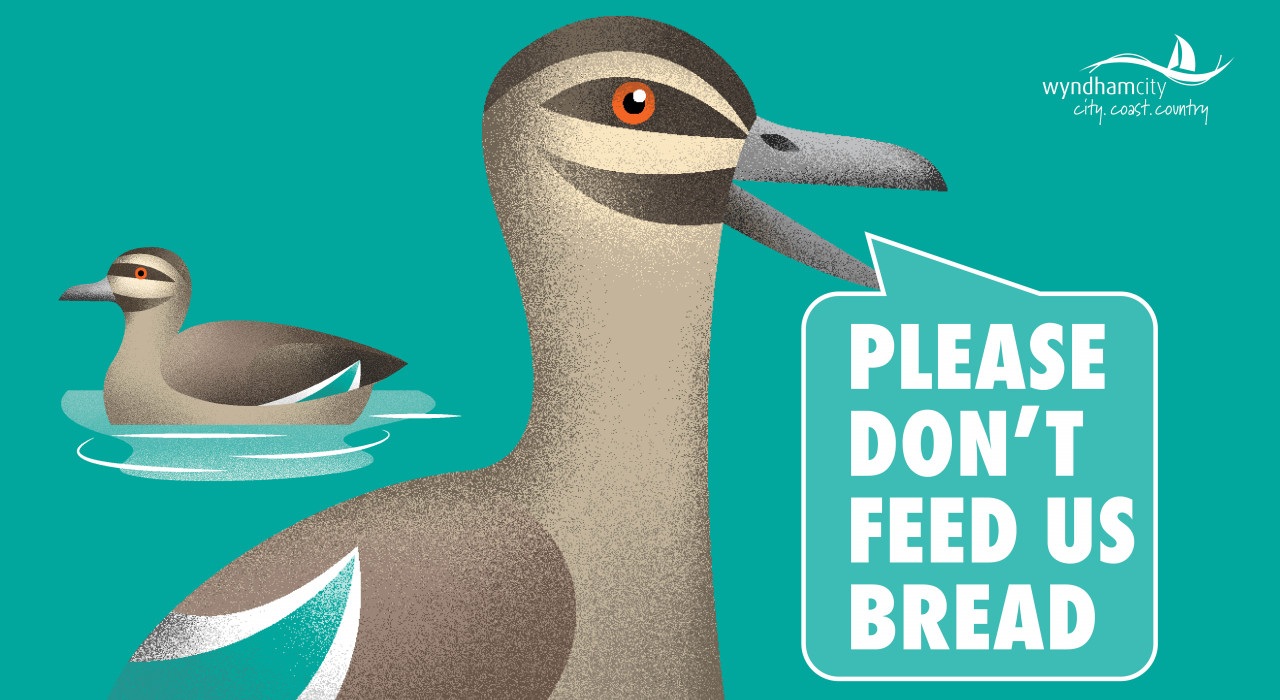We are lucky to live alongside a diverse variety of native wildlife in Wyndham, from lorikeets and honeyeaters in our trees, ducks and frogs in local wetlands and waterways, and native pollinators and reptiles that call the native grasslands home.
As much as we love and want to help our native wildlife, it’s never a good idea to feed them non-native food as it doesn’t meet their nutritional needs. Rather than feeding wildlife, a better way to connect with our unique animals is by spending time in nature in one of Wyndham’s many reserves and waterways, or planting habitat trees and shrubs in your garden to encourage wildlife to visit your home.
You can find more information about planting habitat for wildlife at Habitat Heroes.
Ducks
For many people, feeding the ducks is a popular past time that both kids and adults enjoy, however unfortunately bread is like fast food for ducks. For them, one slice of bread is equivalent to three slices of pizza, and can lead to long term nutritional imbalances, increase the risk of disease, and alter the duck’s natural behaviour.
A Ducks Diet
Ducks and other waterbirds are expert foragers and great at finding all the food they need growing and living naturally around our local waterways. Whilst mostly vegetarian, many ducks will supplement their diet with small crustaceans, molluscs and aquatic insects.
Many duck species are also referred to as Dabbling Ducks. They will dabble in the shallow water amongst aquatic vegetation or plunge their head under the surface whilst raising the tail end vertically to forage for food deeper in the water.
Alternative options
Whilst we don’t recommend duck feeding in our local waterways, we do love that the Wyndham community have the opportunity to enjoy interactions with our local wildlife.
Rather than feeding the ducks, why not challenge yourself to identify as many different duck or waterbird species as you can each time you visit Wyndham’s open spaces?
- How many Pacific Black Ducks can you see?
- Can you tell the difference between a female Chestnut Teal and a Grey Teal?
- Are there any ducklings around?
- Look out for any wading birds! If you watch a White-faced Heron long enough, you can often see them catch a frog for lunch.
If you can’t resist feeding our web-footed friends the occasional treat, it’s ok to feed them:
- cut grapes.
- cooked rice
- peas and corn
- oats
- chopped lettuce.
Magpies
Magpies are an iconic Australian bird with their melodic call and feisty nature during breeding season. This has earned them the spotlight in many well-known Australian poems, songs, and stories. Because of our love for this iconic bird, it’s not uncommon for people to form close bonds with their neighbourhood maggies by feeding them.
Whilst our intentions may be good, feeding food such as mince to magpies and other meat-eating birds can cause serious harm in the long run.
A Magpies Diet
In the wild magpies will naturally feed on a variety of prey such as worms, frogs, lizards, small rodents, as well as seeds and fruit. These food sources are naturally available in urban areas and provides them with the appropriate protein levels they need to maintain feather quality, and to raise strong, healthy offspring.
Mince brought from your local supermarket does not contain the correct nutrients for a magpie’s diet and can result in stunted growth in young birds, brittle feathers, misshapen beaks, and overall malnutrition.
Alternatives
The best option for our magpie friends is for us to allow them to forage for their own food in our backyards and local parks. You can also leave a bird bath of fresh water in your garden to provide water for them and other birds on hot summer days.
If you cannot resist feeding your local magpies, a healthier alternative to mince is to feed them a handful of meal worms as an occasional treat.
Food Scraps
It’s never a good idea to feed your leftover food scraps to wildlife. The presence of unsightly food scraps on nature strips, public open spaces, or garden beds not only reduces the aesthetic appeal of an area, but also poses environmental and health hazards. Food scraps left out in the open can attract unwanted pests such as mice, rats, foxes, feral cats, and invasive bird species, which can then have a negative effect on native wildlife.
It is important to note that littering is illegal, and individuals caught engaging in this behaviour may be subject to fines. To report littering, you can utilise Councils online portal or contact customer service on 1300 023 411.
For information about Wyndham City Council’s recycling and waste services please view our residential waste and recycling guide.
